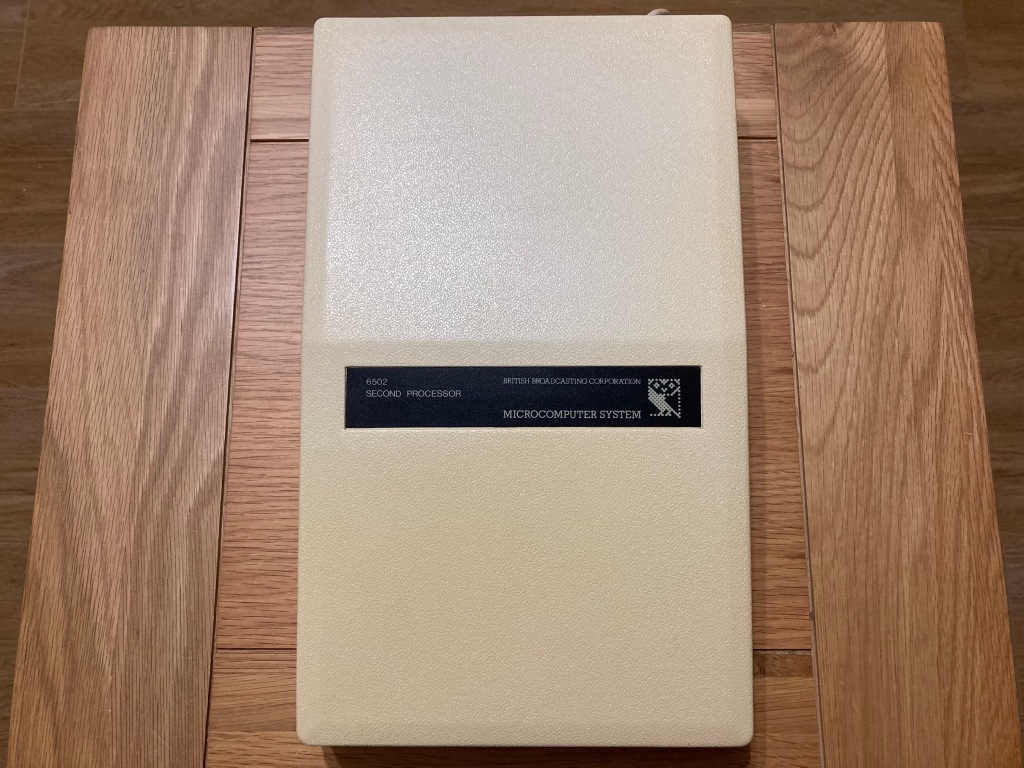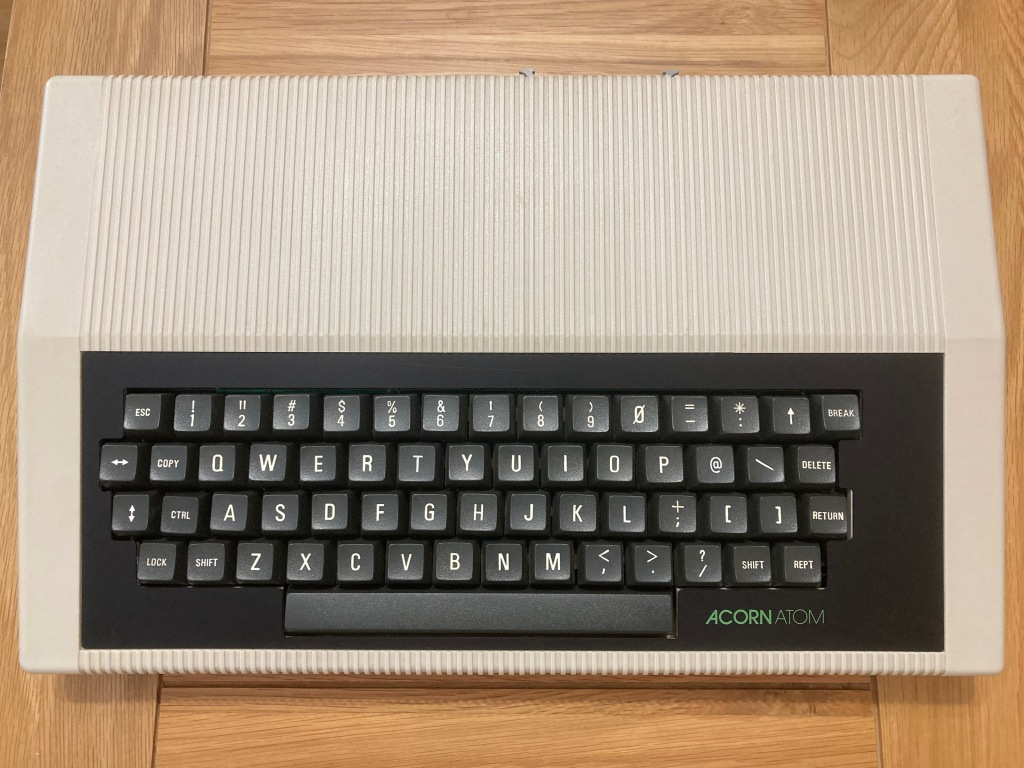
Welcome to my Acorn collection.
This page is a repository for all of the Acorn systems, peripherals, and accessories in my collection – it’s currently a work-in-progress, and I’ll continue to add things as and when I have the time.
Acorn Atom
| Type | Home computer |
|---|---|
| Release date | March 1980 |
| Discontinued | July 1982 |
| Operating system | Atom BASIC |
| CPU | MOS 6502 @ 1 MHz |
| Memory | 2 KB (12KB max.) |
The Acorn Atom is a home computer made by Acorn Computers Ltd from 1980 to 1982, when it was replaced by the BBC Micro. The Atom was a progression of the MOS Technology 6502-based machines that the company had been making from 1979, a cut-down Acorn System 3 without a disk drive but with an integral keyboard and cassette tape interface, sold in either kit or complete form.
Acorn BBC Model B
| Type | Home computer |
|---|---|
| Release date | December 1981 |
| Discontinued | February 1994 |
| Operating system | Acorn MOS |
| CPU | MOS 6502 @ 2 MHz |
| Memory | 32 KB |
The British Broadcasting Corporation Microcomputer System, or BBC Micro, is a series of microcomputers and associated peripherals designed and built by Acorn Computers Ltd in the 1980s for the BBC Computer Literacy Project. Designed with an emphasis on education, it was notable for its ruggedness and expandability. The Micro began life as an upgrade to the Atom, originally known as the Proton.
My Model B is signed by Steve Furber, the principal hardware engineer for the BBC Micro.

Acorn BBC Micro 6502 Second Processor
| Type | Computer Peripheral |
|---|---|
| Release date | March 1984 |
| Discontinued | Unknown |
| Operating system | Hi-BASIC |
| CPU | WDC 65C02 @ 3 MHz |
| Memory | 64 KB |
The 6502 Second Processor was an expansion unit for the BBC Model B and Master, which used the proprietary Acorn “Tube” interface to add a coprocessor to the computer in a “host-parasite” model, where the external processor takes overall control. These kind of expansion units had a case with the same profile and styling as the main computer, which became affectionately known as the “cheese wedge”.
Acorn Electron
| Type | Home computer |
|---|---|
| Release date | August 1983 |
| Discontinued | July 1985 |
| Operating system | Acorn MOS v1.0 |
| CPU | Synertek SY6502A @ 1/2 MHz |
| Memory | 32 KB |
The Acorn Electron is a budget version of the BBC Micro educational computer introduced by Acorn Computers Ltd on 25 August 1983. It has 32 KB RAM, and its ROM includes BBC BASIC v2 along with its operating system. The Electron was one of the best selling microcomputers in the UK, and is estimated to have sold between 200,000 and 250,000 machines over its commercial lifespan.

Acorn Electron Plus 1
| Type | Computer peripheral |
|---|---|
| Release date | August 1983 |
| Discontinued | November 1985 |
| Operating system | N/A |
| CPU | N/A |
| Memory | N/A |
The Acorn Plus 1 added two ROM cartridge slots, an analogue interface (supporting four channels) and a parallel port to the Electron. The analogue interface was normally used for joysticks, and the parallel interface was typically used to connect a printer. Cartridge games would boot automatically; language cartridges would take precedence over BASIC. Six ROM cartridge titles were announced for the launch of the Plus 1.

Acorn Electron Plus 3
| Type | Computer peripheral |
|---|---|
| Release date | October 1984 |
| Discontinued | Unknown |
| Operating system | N/A |
| CPU | N/A |
| Memory | N/A |
The Acorn Plus 3 was a hardware module that connected to the Acorn Electron and provided a “self contained disc interface and 3.5 inch single sided disc drive” offering over 300 KB of storage per disc using the newly introduced Advanced Disc Filing System (ADFS). The original Electron edge connector was repeated on the back of the Plus 3, allowing the Plus 1 to be used in conjunction with the Plus 3.
Acorn Archimedes A3000
| Type | Home computer |
|---|---|
| Release date | May 1989 |
| Discontinued | Unknown |
| Operating system | RISC OS 2 |
| CPU | ARM2 @ 8 MHz |
| Memory | 1 MB (4 MB max.) |
In May 1989, the Acorn 300 series was phased out in favour of the new A3000, reported to be the first home microcomputer to use SMD technology in its construction. The A3000 featured an 8 MHz ARM2 CPU, 1 MB of RAM, and RISC OS on 512 KB of ROM. Unlike the previous models, the A3000 came in a single-part case similar to the Amiga 500 and Atari ST, with the keyboard and disc drive integrated into the base unit.

Acorn RISC PC 600
| Type | Home computer |
|---|---|
| Release date | April 1994 |
| Discontinued | Unknown |
| Operating system | RISC OS 3.5 |
| CPU | ARM610 @ 30 MHz |
| Memory | Up to 256 MB (+ 1 or 2 MB VRAM) |
Acorn launched the Risc PC 600 in 1994, their first major hardware change since the launch of the A540 and the ARM3 CPU in 1990. The Risc PC 600 had a 30MHz ARM610 CPU and a new version of RISC OS (3.50) to support the new hardware – the support chips (VIDC, MEMC and IOC) were upgraded to the VIDC20 and IOMD. The Risc PC 600 changed to a standard PC AT keyboard, but kept the proprietary Acorn 3 button mouse.
My RISC PC has a 200MHz StrongARM and a 40MHz 486 CPU, and 32+2 MB RAM.
Acorn AKF-17 CRT Monitor
| Type | Computer display |
|---|---|
| Release date | June 1989 |
| Discontinued | Unknown |
| Operating system | N/A |
| CPU | N/A |
| Memory | N/A |
The Acorn AKF-17 is a 14″ 15KHz CRT colour monitor, often bundled together with an Acorn Archimedes computer in electronics stores. These are compatible with the A3000, A3010, A3020, A4000, and A5000 computers, featuring a DB9 RGB video connector.
Microvitec CUB 653 CRT Monitor
| Type | Computer display |
|---|---|
| Release date | March 1983 |
| Discontinued | Unknown |
| Operating system | N/A |
| CPU | N/A |
| Memory | N/A |
The Microvitec CUB CRT was the 14″ medium-resolution option from the range of Microvitec CUB range of colour displays. The 653 incorporates a medium-resolution CRT with 653 addressable pixels horizontally by 585 addressable pixels vertically; many systems were supported, including the BBC Micro.
Opus 5802 5.25″ FDD
| Type | 5.25″ Floppy Disk Drive |
|---|---|
| Release date | October 1983 |
| Discontinued | Unknown |
| Operating system | N/A |
| CPU | N/A |
| Memory | N/A |
The Opus 5802 is a 5.25″ floppy disk drive (FDD), which supports double-sided single density disks (1MB unformatted, 800KB formatted), and is switchable between 40 track and 80 track operation. The drive can be controlled and powered from a BBC Micro.

BBC 40T 5.25″ FDD
| Type | 5.25″ Floppy Disk Drive |
|---|---|
| Release date | September 1983 |
| Discontinued | Unknown |
| Operating system | N/A |
| CPU | N/A |
| Memory | N/A |
The BBC 40T SS 100K is a 5.25″ floppy disk drive (FDD), which supports double-sided single density disks (1MB unformatted, 800KB formatted), 40 tracks only The drive can be controlled and powered from a BBC Micro.







